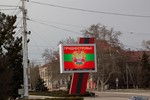Developing a New Research Agenda on Post-Soviet De Facto States
The scholarship on post-Soviet de facto states has structurally focused on issues related to their contested status, and has long …
Conceptualising Post-Soviet de facto States as Small Dependent Jurisdictions
De facto states, according to the most established elaborations of the concept, by definition strive towards full-fledged, …
The external relations of de facto states in the South Caucasus
Post-Soviet de facto states are small-sized jurisdictions with limited domestic resources. They need credible military support from a …
The presidential election in Transnistria
Originally published on Presidential Power
The presidential election that took place on 11 December 2016 in Transnistria, a de facto independent state within the internationally recognised borders of Moldova, ended with the resounding victory of the speaker of parliament, Vadim Krasnoselski (62,3%), over the incumbent president, Yevgeny Shevchuk (27,38%), the candidate of the Communist party, Oleg Khorzhan (3,17%), and others (including 3,4% who voted “against all”, which is formally one of the options given on the ballot).
Russia and pensions in post-Soviet de facto states
This post outlines basic information about pensions in Abkhazia, South Ossetia and Transnistria, and the role of Russia in financing the pensions of residents in these territories. It is based on data and information available online, and includes references to relevant legislations and international treaties. All information comes either directly from official sources, or from news agencies quoting official sources.
Journals focused on post-Soviet, post-Communist and Eastern European affairs
It requires a big effort to stay up-to-date with academic publications in one’s sphere of interest. I put together this post to make it easier to have at least a quick overview of what has been published recently in English-language peer-reviewed journals for those with an interest in post-Soviet, post-Communist and Eastern European affairs.
First, there’s a list of the journals I think are most relevant for scholars focusing on this region, in no particular order (if you think I am missing something important, please let me know).
Social media in post-Soviet de facto states
Here you find Facebook interest lists and Twitter lists including the pages and public profiles of institutions, news outlets, NGOs as well as public figures related to post-Soviet de facto states.
Any Facebook or Twitter user can subscribe to these lists and follow the online activities that appear on these social media and relate to either of the post-Soviet de faco states.
Some of these lists gather a considerable number of sources (e.
In Abkhazia, worried about the language law
The law “On the state language”, approved by the authorities in Sukhumi in 2007, risks exacerbating inter-ethnic relations in Abkhazia, a territory that remains largely multi-ethnic, even after the ethnic cleansing that happened during the war. Our correspondent went to Abkhazia to find out more about it. A feature story
Gendercide in the South Caucasus
“A boy is OK, a girl is not”. In the Southern Caucasus, male newborns outnumber females by more than 10%. Experts have no doubt that the cause lies in the practice of selective abortions, an already-known phenomenon in China and India. This clearly shows how gender inequality is still highly present in the region




